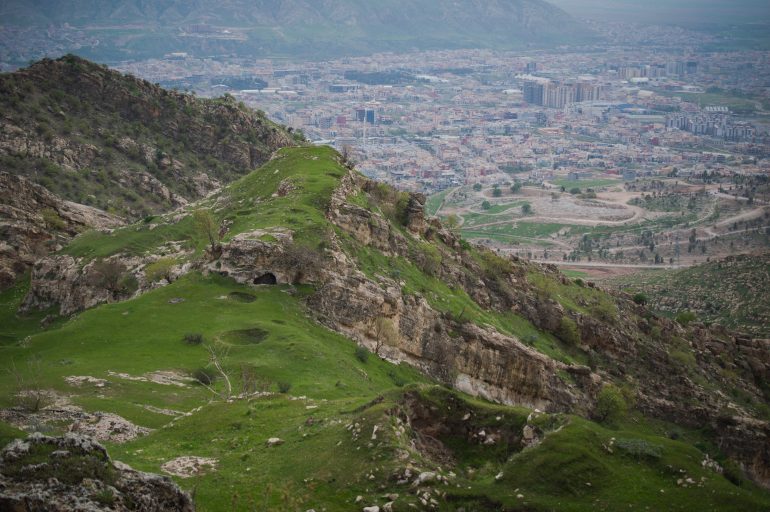"Kurdistan will not back down in the face of the Iraqi authorities' hostile policies," one banner said at the demonstration in Dohuk, the third-biggest city in the Kurdistan region of northern Iraq. "Solidarity with our people in Kirkuk," said another placard.
An administrator in a hospital, Massoud Mohamed, said he had not received a salary in two months. "We must get our rights," the 45-year-old said. "They want to weaken our region."
Previously the region, thanks to its oil exports, had independent funding that partially covered salaries. Since the end of March it has been deprived of this resource because of a dispute with Baghdad and Turkey, through which oil was exported.
In response, Kurdish protesters tried to reach the headquarters on Saturday, and the situation degenerated.
Four Kurds were killed.
In a statement released on Monday, the court clarified that its decision is grounded in the violation of Article 61/Fourth of the Iraqi Constitution. This article states, "The process of ratifying international treaties and agreements shall be regulated by a law enacted by a two-thirds majority of the members of the House of Representatives."
The 2013 agreement set guidelines for navigation through the Khor Abdullah waterway, a contested estuary between northern Kuwait and southern Iraq. Both countries are building ports along this shared waterway, but have not yet reached an agreement on demarcating the maritime border. The land border was set by the United Nations in 1993 following Iraq's invasion of Kuwait in 1990; however, the maritime boundary remains a point of contention.
'Any act disturbing the peace in Kirkuk would harm the stability of Iraq.'
Erdogan adds: Turkish intelligence and the Foreign Ministry are closely following the developments in Kirkuk.
"We see a relative calm in Kirkuk as we observed from (Turkish officials') talks with Iraqi Prime Minister Mr. (Mohammed S.) Al Sudani and their counterparts. I instructed Foreign Minister Hakan Fidan and National Intelligence Organization (MIT) President Ibrahim Kalın to follow the developments. (Our officials) held talks with Al Sudani, with the Barzani family." [Note Barzani family]
According to the daily state-owned al-Sabah, Erdogan refered to Kirkuk as the "homeland of Turkmens," an ethnic Turkic community, and "a place where different cultures peacefully coexisted for centuries. "We will not allow acts that will harm the peace and integrity of this region," he said.
Kurdish media split on Duhok protest coverage


Notably absent was coverage by media outlets affiliated with the PUK, opposition-linked websites, and other independent publications based in Sulaymaniyah. In contrast, KDP-affiliated media provided extensive coverage, featuring videos and photos of hundreds of protesters waving Kurdistan flags.
Critics on social media questioned the KDP's support for this protest while cracking down on other gatherings advocating for similar demands from the KRG. In 2020, KDP security forces had aggressively suppressed protests over delayed salaries and cutbacks, resulting in multiple arrests.
Diliman Abdulkadere commented, "Under KDP/Barzani logic, a protest is legal when organized by us and attended by coerced teachers to plea for funds from Baghdad. Conversely, a protest becomes illegal and demonstrators are labeled 'terrorists and spies' when they independently take to the streets to demand their basic rights."
Suspect at large as police officer killed during arrest attempt
Claims of deteriorating security situation in Kirkuk rejected by officials
The Security Media Cell, an official media arm of Iraq's Prime Minister's Office, refuted reports of deteriorating security conditions in the Kirkuk Governorate through a Twitter thread posted Monday evening. The statement comes in response to claims made by certain media outlets suggesting that local security was losing control over the area.
The Security Media Cell insisted that "the security situation throughout the province of Kirkuk is stable," adding that anyone promoting contrary news is "trying to shuffle the cards." The organization further emphasized the unity and stability of Iraq, urging the public to seek information from official sources.
The statement comes on the heels of Saturday's protests in Kirkuk, where security forces' killed four Kurdish protestors. The Security Media Cell's tweet thread was accompanied by a video featuring a local police chief flanked by tribal leaders from Kirkuk, reassuring residents that subsequent protests were conducted peacefully and that the situation remains calm.
The Security Media Cell's latest communication calls for "accuracy in conveying information" and urges all parties to prioritize "the unity, interest, and stability of Iraq."
Full statement
Dindar Zebari: Not a single person in Kurdistan Region jailed for political views

In a recent meeting held in Sulaymaniyah, Bafel Talabani received a high-level Iraqi security delegation led by Iraq’s top national security adviser, Qasim al-Araji.
The focus of their discussion was the unrest in Kirkuk and the 'need for improved security and intelligence coordination between Kurdistan and Baghdad'. Talabani conveyed his deep concern about the situation, stating, "the shedding of blood by Kurdish youth is unacceptable," and urged that "the perpetrators should be brought to justice as soon as possible."
The PUK leader emphasized the need for stability in Kirkuk, saying, "Kirkuk’s stability is a red line." He also called for harmony and coexistence in the ethnically diverse region, adding, "We would not allow the lives and fates of the Kirkuk people to be the victim of the political rivalries."
The PUK had implicitly blamed the KDP for the violence on Saturday in which four Kurdish protestors were killed by Iraqi security forces.











